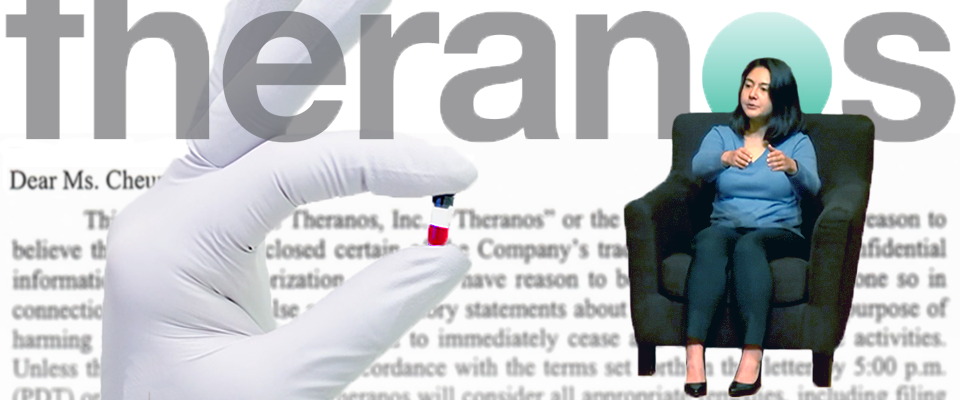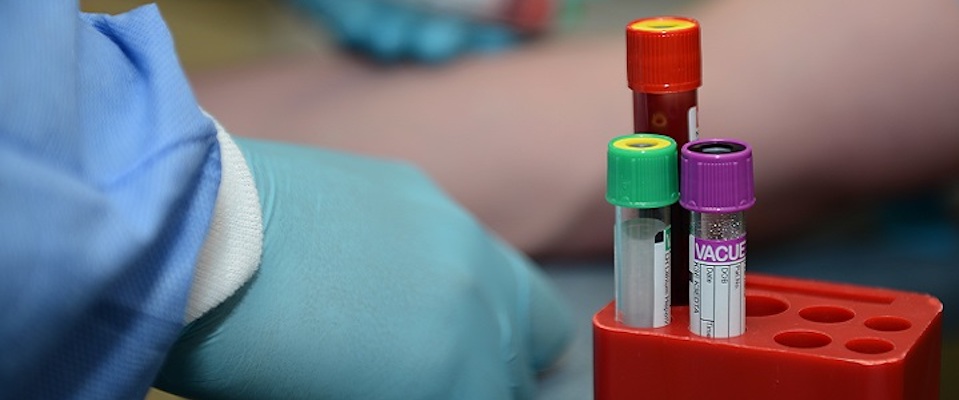On Monday, March 18, HBO will air the documentary The Inventor: Out for Blood in Silicon Valley about the stunning rise and dramatic fall of the Silicon Valley healthcare company Theranos.
The documentary will no doubt be avidly watched by those around the world who even casually followed the tale of founder Elizabeth Holmes, the Stanford dropout who modeled herself after Steve Jobs—even down to the ubiquitous black turtlenecks. In 2003, she founded Theranos, which promised low-cost technology that could detect a wide variety of health ailments with a few drops of blood from a fingertip.
“I was 22 years old,” Cheung said. “It was a job I could see working at for 10 years. I thought I was really lucky.”
When Erika Cheung, a UC Berkeley grad, first saw the documentary—in which she appears—at the Sundance Film Festival, she was watching the last five years of her life unfold before her. Cheung worked at the company for seven months and was one of the main whistleblowers who helped journalists uncover what the Securities and Exchange Commission last year called massive fraud.
For Cheung, it all started happily enough. She found what she thought was her dream job at a Berkeley job fair in 2013. A senior at the time, majoring in cell biology and linguistics, Cheung was excited to work for a company at the intersection of health and technology.
“I was 22 years old,” Cheung said. “It was a job I could see working at for 10 years. I thought I was really lucky.”
Cheung imagined herself being at the forefront of accessible, affordable healthcare. What she couldn’t possibly foresee—as few did, even those much older and more experienced than she—was that she would become entangled in what is now seen as one of the great cautionary tales of Silicon Valley.
By the time Cheung joined Theranos, it had raised more than $45 million and boasted a board that included Henry A. Kissinger, former Senator Samuel Nunn, and former secretary of state George P. Shultz. It had also just announced a partnership with Walgreens to allow consumers to test blood at their stores’ pharmacies and was staring to garner glowing national media attention.
But Cheung, even in her early days of employment, was seeing a different story. About a month in she was asked to run quality control on a patient’s sample.
Cheung couldn’t keep quiet about what she saw. There were problems, and it was in her nature to fix them.
“I kept running it and it kept failing, it kept failing, it kept failing,” she said. “It was Thanksgiving Day and no one was in the lab—it was just me by myself—and I was freaking out. I contacted this help line we had and said, ‘I don’t know what to do, this quality control keeps failing, I’m resetting the whole system, but I don’t feel comfortable sending out this patient’s sample.’”
The response, she said, was to bring in a research associate, who deleted data points, saying, “these are outliers—you can get rid of these.”
That was just the beginning, for Cheung, of a dawning realization that the company was more interested in getting things out than getting them right. But she was young, “a starry-eyed 22-year old just out of university,” as she puts it, who didn’t necessarily know what to expect from the working world. She remembers thinking, “This I my first-big girl job. This doesn’t seem right, this doesn’t work right with the general principles of scientific integrity, but maybe I’m not seeing something. Maybe this is normal.”
The young employee, however, couldn’t keep quiet about what she saw. There were problems, and it was in her nature to fix them. She talked to her superiors. She called meetings with all the senior scientists and questioned the quality control data.
The response? The scientists would agree that the process should be shut down to find the problems, but then Holmes and Theranos president Ramesh “Sunny” Balwani would demand to know why samples weren’t being processed.
Cheung described lab machines that used glass tips to process patient samples. “They would jam and break all the time, and we would do the error reports when this happened,” she said. “I put these sheets up to track these errors and everyone agreed—the sheets were getting filled out.”
Then the sheets disappeared.

Ethical concerns aside, Theranos was not a pleasant place to work. Balwani “was a clear dictator and fearmonger, always yelling at people,” Cheung said. “Elizabeth was too—we can’t let her off the hook. Elizabeth would have big visions—’I want this to process patient samples in 20 minutes’—things that weren’t possible. And when people would contest it, she would say ‘you’re not a team player.’
“I don’t know how many times I cried at the office because I was under so much stress,” she said. “I’ve never cried at work since.”
Theranos was deliberately siloed, so teams couldn’t communicate with each other. But Cheung was very close friends with a colleague, Tyler Shultz, who graduated from Stanford in 2013 and started working at Theranos just before she did. Shultz, grandson of George Shultz—who was on Theranos’s board—was also one of the first to speak out about the company’s misdeeds.
She and Shultz ate lunch together every day and confided to each other about their concerns and the fact that patients were being misled by erroneous samples.
“I was trying to hope it wasn’t a scam,” Cheung said. “I thought it was badly managed. I was hoping that somewhere in that building there was something I wasn’t seeing—[that] there was a wonderful device that existed.”
But there was no sign of that wonderful device, and she was at her wit’s end.
“I’m crying on the phone to my dad, saying, ‘I don’t know what to do, I know I have a good job, I’m making really good money, I’m in the Silicon Valley, but I can’t do this anymore,’” Cheung said. “And my father said the most beautiful thing. He said, ‘you’re a smart girl, I trust you, you’ll figure it out.’”
“I don’t know how many times I cried at the office because I was under so much stress,” she said. “I’ve never cried at work since.”
And so, seven months after she started, in April of 2014, Cheung decided to quit.
In the months after she left, Theranos was lauded as a Silicon ‘unicorn;’ Holmes appeared on the cover of numerous national magazines; and a profile in The New Yorker called her quest “one women’s drive to upend medical testing.” Fortune valued the company at more than $9 billion.
But some people were raising questions, most importantly John Carreyrou, a Wall Street Journal investigative reporter. At the suggestion of another former Theranos employee, he reached out to Cheung, who was then working at a new company.
“I told him that I was very scared of this company—they take secrecy to an extent I’ve never seen before—and I’m a little nervous having my identity uncovered,” she said. In fact, Theranos told employees not to put the company’s name on their LinkedIn profile—to just write “private biotech company.” She had also signed a non-disclosure agreement.
The company tried to intimidate her into silence. One day, after she had talked to Carreyrou anonymously, she said, “My co-workers came up to me and said, ‘There’s been someone in the parking lot hanging out all day.’ I’m starting to have a panic attack.” When she went outside, she was handed a letter addressed to a place in Palo Alto where she was staying only temporarily before moving into a more permanent home—an address even her mother didn’t know.
The letter accused Cheung of disclosing trade secrets and threatened to sue her. She consulted a lawyer, who told her to report what she had witnessed to federal health regulators and to ignore the letter. She never received another legal threat.
“I was trying to hope it wasn’t a scam…I was hoping that somewhere in that building there was something I wasn’t seeing.”
In October 2015, Carrreyrou’s initial story questioning the veracity of Theranos’s bold claims, was published; it was just the first of many articles that ultimately led to the publication last May of his book, Bad Blood: Secrets and Lies in a Silicon Valley Startup, and the new HBO documentary.
“I was never intending to go on the record,” she said. But while working in Hong Kong, where she moved for a job in 2016, she was subpoenaed to be deposed remotely for a lawsuit filed by Partner Fund Management LP, who alleged that Theranos had defrauded the hedge fund.
The depositions were unsealed, which meant Cheung’s name went public.
“I started to get emails from friends saying, ‘Hey, I saw you in the SF Chronicle, I saw you in Bloomberg.’ and I’m freaking out,” she said. The public notoriety “was a bit of a scary reality.”
In July 2016, regulators revoked the certification of Theranos’s laboratory. Last year, the SEC charged Theranos, Holmes, and Balwani with “raising more than $700 million from investors through an elaborate, years-long fraud.”
Cheung took a three-month break after leaving Theranos to travel. Then she found another biotech company where her decision to leave Theranos was seen as more of a plus than a minus. After a while, she wanted out of the Valley, and when the opportunity arose for a job in tech investments in China, she decided to go for it.
Even five years after leaving the company and talking so much about it, she is still not sure why Theranos went to so badly off track.
“Where I see failures with patient samples and not letting them know because you’re scared—that’s extreme negligence and that’s bad. You can’t deceive patients,” she said. “But there’s the other side, where I can empathize. I don’t think [Holmes] went into this trying to con everyone and siphon investors’ money. It wasn’t a traditional tale of greed. She got really in over her head and part of me feels really bad. I wonder if it’s a mental health thing where this person got delusional and detached from reality and was not capable of seeing what was in front of her because she lived in a different world.”
Besides working long hours at her current job, Cheung is also trying to launch a non-profit focused on ethics and entrepreneurship. She hopes to help teach people about what to do when faced with a challenging ethical situation.
Given a do-over, she has no second thoughts. “I would have done exactly the same thing,” she said “It was stressful, but I couldn’t even imagine another path considering the things I was presented with.”






















